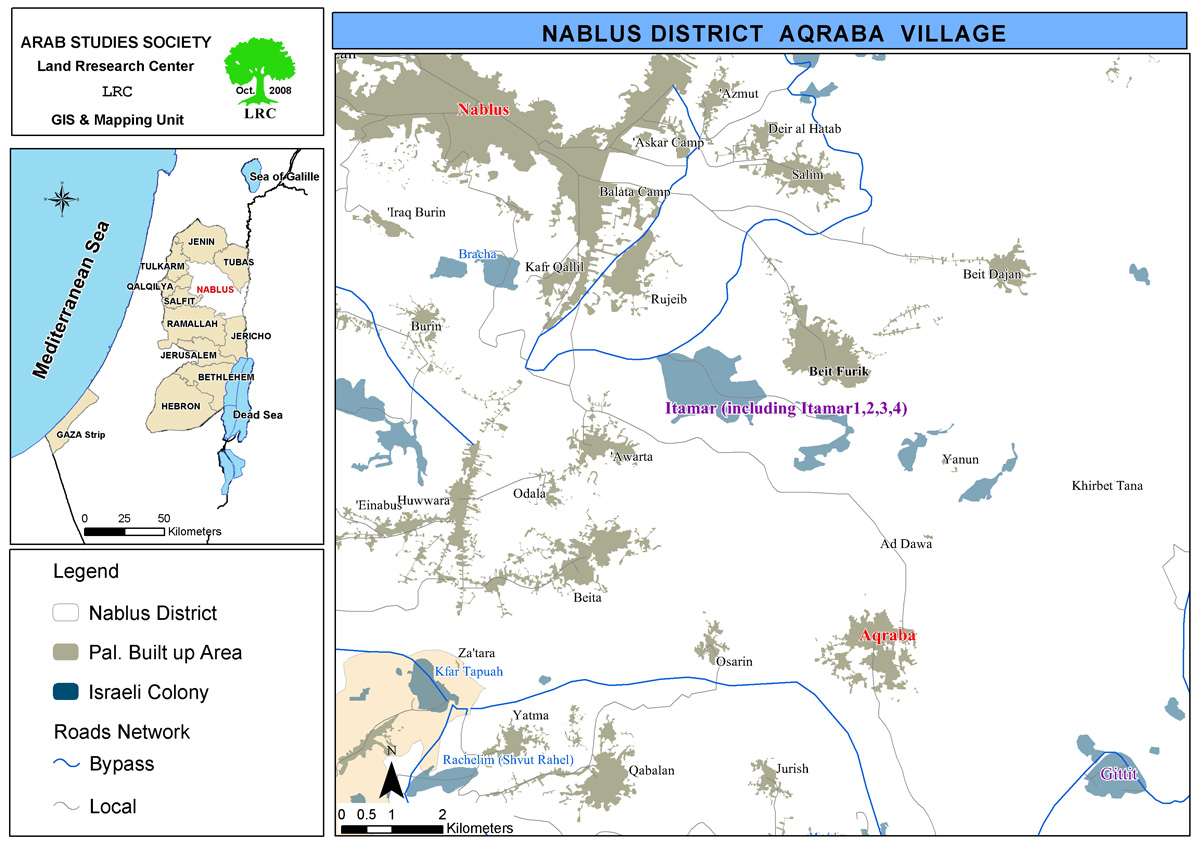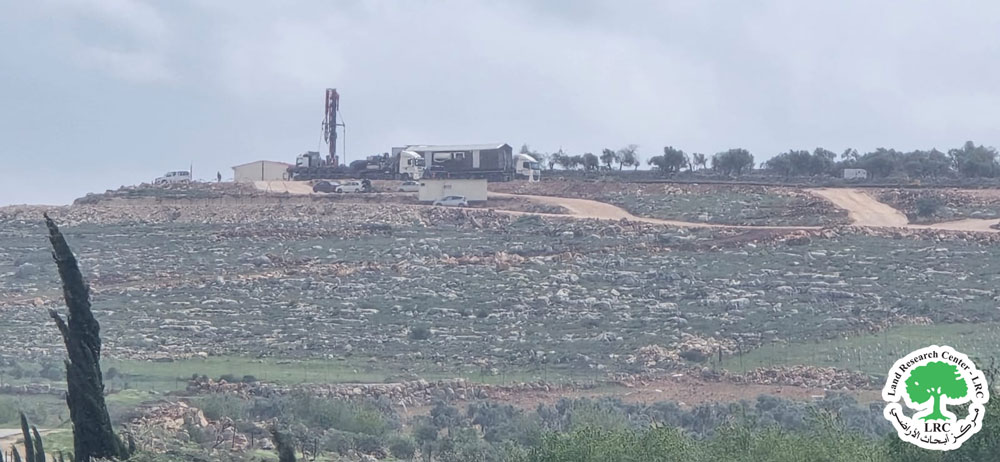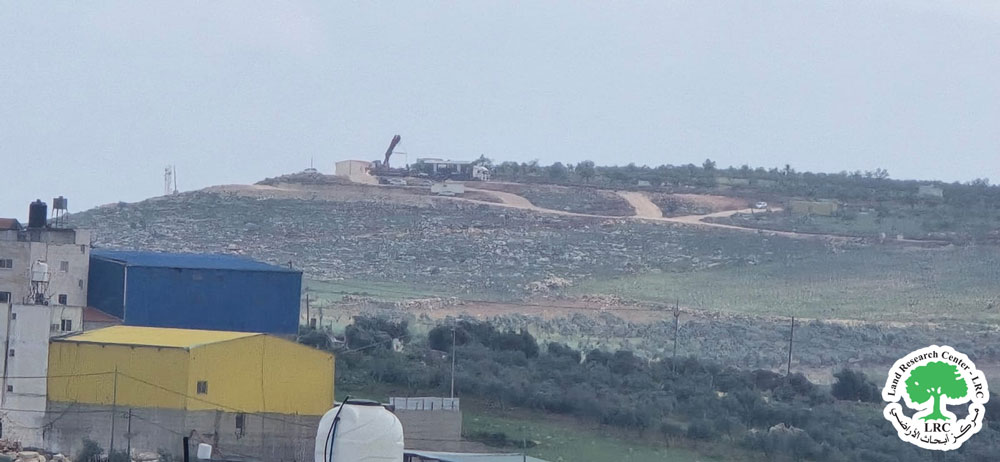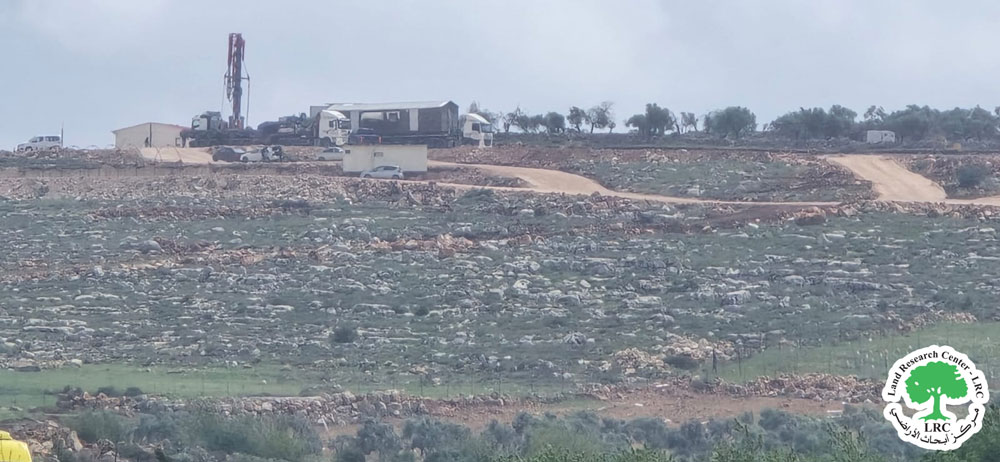Ravaged 7 Dunams to Establish a New Colonial Outpost on The Lands of Aqraba / south Nablus
Violation: Establishment a new colonial outpost.
Location: Aqraba town, south Nablus.
Date: March, 19th 2025.
Perpetrators: Settlers.
Affected party: Aqraba town residents.
Details:
In March,19th 2025, Wednesday, settlers began to establishing a new colonial outpost in Al Wajh Al Qably area, east Aqraba town, just 200 meters from road linking between Aqraba and Majdal Bani Fadal Village.
Settlers ravaged no less than 7 dunams from pastoral lands with pave a colonial road, in addition to put 5 residential units in the location.
According to accords in Aqraba Municipality, the location that took control by settlers classified as ‘’ State Land’’, noted thaht the settlers took control of the location over past two years, as they put a flag of occupation on it. Today they began to transferring the location into a new colonial outpost.
Mr. Salah Aldeen Bani Jaber, the president of Aqraba Municipality, told to LRC researcher as follows:
‘’We, the resident of Aqraba are suffering from settlers and occupation’s practices on the lands of town. Khirbet Al Taweel located east town has had al structures demolished three times in les than three months, today a new colonial outpost is being establish to the east of town. The existence of this outpost will be a miserable due to the attacking of settlers will be increase and preventing farmers from accessing their lands, which amounted 500 dunams planted with olive, also settlers and occupation closed off the road linking between Aqraba and Majdel Bani Fadel, causing a serve damage in the future.’’
It’s worth mentioning that field research team documented over past several months establishment a new colonial outpost east town near Gittit settlement, as it’s a second outpost that established over past 8 years.
About Aqraba:
18 kilometers to the southwest of Nablus, Aqraba can be set as an example of a recurrent target for the Israeli occupation attacks.
The village totals 34,660 dunums in area, mostly, agricultural lands. However, the Israeli occupation announced more than 281,000 dunums of the village lands as "military zone" inaccessible for Palestinians while soaking the area with various colonies including Gittit. That left only 1,350 of Aqraba lands to be built-up area for the village.
The colonies founded on Aqraba lands are expanding on daily basis and area classified as “agricultural settlements”. In addition, the Israelis have placed numerous watch towers and military encampments in order to control the whole region.
More than 500 Palestinians are residing in nomads gatherings around ‘Aqraba; they face day-to-day threats against their houses, tents, shacks; basically, their existence. Additionally, the Israeli colonists try to chase these people out of their fields in an attempt to take over the area.
‘Aqraba is inhabited by around 8,180 people with unemployment rate of 50% because of the restrictions imposed by the Occupiers.
Related link:
Settlers establish a new colonial outpost on the lands of Aqraba in Nablus governorate
United Nations General Assembly Resolutions Regarding Settlement:
- The United Nations General Assembly resolution dated 20/12/1972, in which Israel was demanded to cease a number of measures and practices, including (building Israeli settlements in the occupied Arab territories and transferring some civilian population from Israel to the occupied Arab territories).
- The United Nations General Assembly solution dated 15/12/1972, in which the General Assembly requested Israel to cease annexing any part of the occupied Arab territories and establishing settlements in those territories, and transferring population to them.
- The United Nations General Assembly resolution dated 7/12/1973, in which the General Assembly expressed deep concern over Israel's violation of the provisions of the Fourth Geneva Convention of 1949 and all measures taken by Israel to change the features or demographic composition of the occupied territories and considered them violations of international law.
- The General Assembly resolution dated 29/11/1974 in which the General Assembly expressed grave concern about Israel's annexation of some parts of the occupied territories and the establishment of settlements and transfer of population to them.
- The United Nations General Assembly resolution dated 15/12/1975, consisting of four sections, condemned in the first section all measures practiced by Israel in the occupied territories, describing these practices as constituting serious violations of the United Nations Charter and an obstacle to establishing a lasting and just peace in the region, affirming that these measures are null and void, and have no basis in legitimacy.
- The General Assembly resolution issued on 28/10/1977, which affirmed in its first paragraph that all measures and procedures taken by Israel in the Palestinian territories and other occupied Arab territories since 1967 are legally invalid, and constitute a serious obstacle to efforts to achieve a just and lasting peace in the Middle East. The General Assembly also deeply regrets Israel's continuation in implementing these measures, especially the establishment of settlements in the occupied Arab territories.
Land Confiscation Violates International Laws:
What Israel is doing in the occupied Palestinian territories is considered a violation of the Palestinian people's rights and their lands, and a violation of international laws and conventions. The following are the most important texts contained in international laws and treaties that prohibit Israeli settlement in Palestinian territories and prevent interference with civil and public rights and properties in occupied territories, along with relevant United Nations resolutions.
Lahay Convention / 1907:
- Article 46: The occupying power may not confiscate private property.
- Article 55: The occupying power is considered a manager of lands in the occupied country and must treat the country's properties as private property.
Fourth Geneva Convention / 1949:
- Article 49: The occupying power has no right to transfer its citizens to territories it has occupied, or to take any action that leads to demographic change in them.
- Article 53: The occupying forces have no right to destroy individual or collective personal property, or property belonging to individuals, the state, or any authority in the occupied country.
- Article 147: The destruction and appropriation of property not justified by military necessity and carried out on a large scale in an unlawful and arbitrary manner is a grave breach.
مشروع: حماية الحقوق البيئية الفلسطينية في مناطق "ج" SPERAC IV - GFFO
Disclaimer: The views and opinions expressed in this report are those of Land Research Center and do not necessarily reflect the views or positions of the project donor; the Norwegian Refugee Council.
إخلاء المسؤولية: الآراء ووجهات النظر الواردة في هذا التقرير هي آراء ووجهات نظر مركز أبحاث الأراضي ولا تعكس بالضرورة وجهات نظر أو مواقف الجهة المانحة للمشروع؛ المجلس النرويجي. للاجئين




